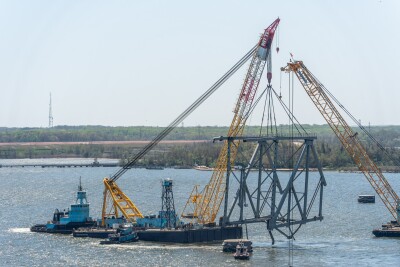Liquefied natural gas offers significantly lower emissions when used in diesel compressed ignition engines, but leakage during bunkering operations can have “a disproportionate impact” on greenhouse gases, a recent study at the University of Delaware found.
The analysis reinforces cautions that as the marine industry adopts more LNG propulsion, the issue of incidental releases will be an environmental and regulatory challenge. Methane, the hydrocarbon in LNG, is much more potent than carbon dioxide for trapping heat in the Earth’s atmosphere.
The U.S. Maritime Administration developed the study in partnership with the University of Delaware and Rochester (N.Y.) Institute of Technology to guide investments for reducing methane emissions in the growing LNG marine propulsion field.
One key finding is that escaping methane during LNG bunkering operations poses a potentially greater source of releases than methane “slip’’ – unburned fuel that escapes with engine exhaust. Slip is also less with diesel compressed ignition engines than when LNG is burned in sparking engines, the analysis found.
The study looked at earlier research findings, and used an updated version of the Total Energy and Emissions Analysis for Marine Systems (TEAMS) model, which helps account for upstream and downstream emissions of LNG, and compared those to the total life cycle emissions for other fuels.
Much of the impetus for adopting LNG for marine engines comes from cost – an inexpensive, domestically available fuel source available for years to come – and the need to lower emissions to meet U.S. environmental goals. But methane’s impact on greenhouse gases is the other side of environmental policy.
“The emergence of market-ready reciprocating internal combustion engines capable of natural gas and/or dual fuel operation in maritime service makes studies such as this one more important for industry leaders and policy decision makers,” the authors wrote. “Multiple firms are building or are planning to build vessels using these engines, making this research extremely relevant to current investment decisions.”
Overall, the use of LNG in compression ignition engines has the potential to reduce greenhouse gas emissions by 6% to 15% compared to low-sulfur diesel fuel, the researchers found. By contrast, spark ignition LNG engines may actually have higher greenhouse gas emissions by 5% to 13%.
“This work shows that compression ignition LNG systems will provide total fuel cycle GHG (greenhouse gas) emissions benefits compared to low sulfur and residual oil systems; however spark ignition LNG systems will not,” the report says.
"The second important finding is that routine bunkering leakages can have a disproportionate impact on overall GHG emissions due to the high volume of natural gas throughput and the high global warming potential of methane,” the authors wrote. “Leakage issues from any bunkering operation should be carefully considered in infrastructure planning and operational purposes and leakage emission rates need further testing under actual bunkering procedures.”





